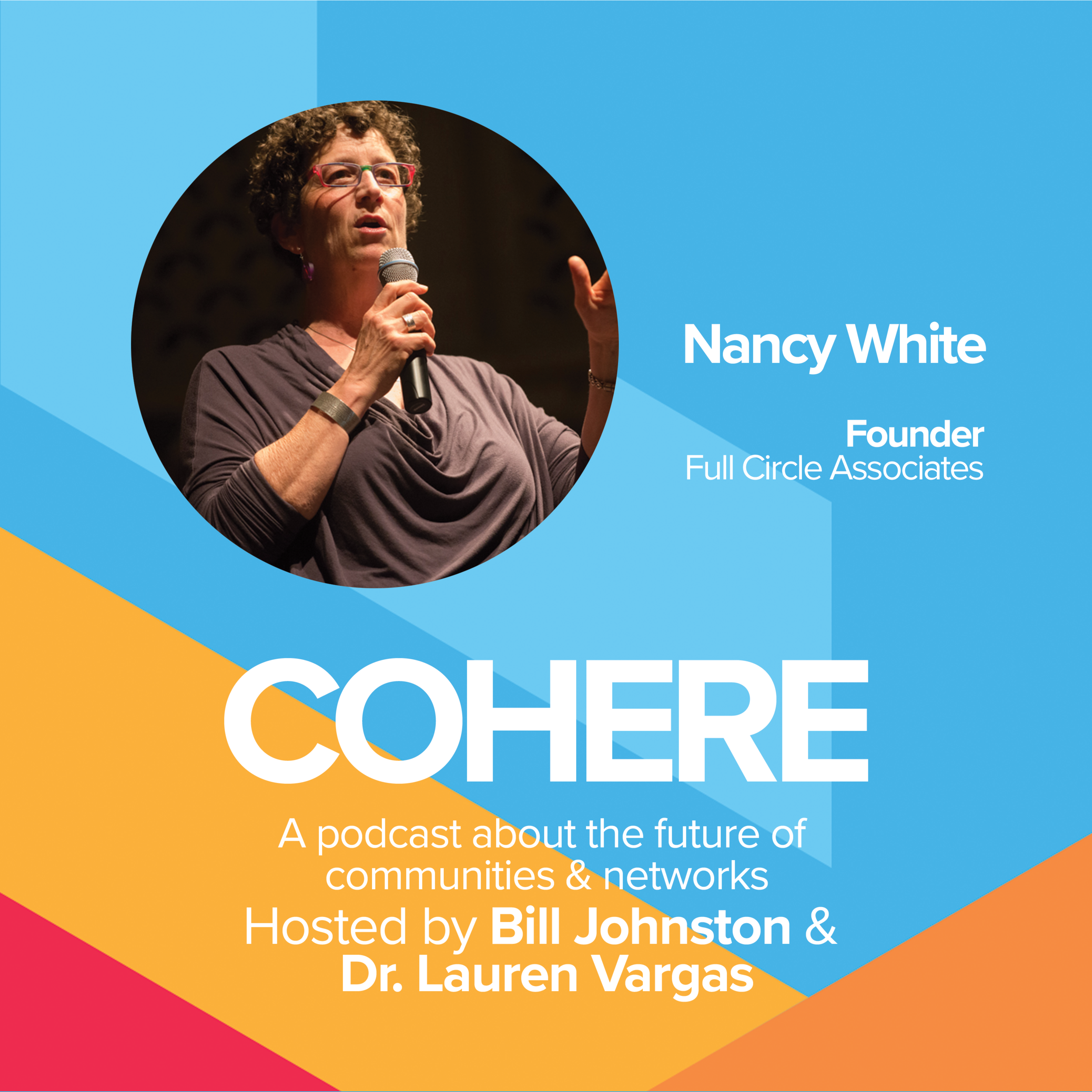[Podcast] How the Pandemic Forced Online Collaboration to Mature - With Nancy White
How the Pandemic Forced Online Collaboration to Mature
“We were forced to get over diddling with how we do these things online and actually do them effectively.”
In this episode of the Cohere podcast, Bill Johnston and Dr. Lauren Vargas welcome Nancy White back to the show. Nancy is a true polymath, involved in shaping the early online community and collaboration movement and also deeply versed in group facilitation. Nancy is the Founder of Full Circle Associates, and has a long history of working with global NGOs and non-profits on large scale collaboration and community initiatives.
In the episode we talk to Nancy about her personal experiences during the pandemic, what changes she’s observed in her communities and in her work, and explore how we might take what we have learned about collaboration and communities during the pandemic with us back into the world when we begin to emerge from the pandemic.
Note: You can catch the first (mini) episode with Nancy here.
Key Quotes:
““There was just a tidal wave of experimentation and adaptation that community did. That community spread that across their communities. So we saw an explosive network, growth of practice and practitioners who needed to connect with each other needed to connect with the people they’re connecting with.
I think this is a particularly salient lesson: If we think, and believe, and act on the idea that the collaboration patterns that we’ve begun in during the pandemic can serve us going forward. We actually want to pay attention to those practices and make them better. ”
“[Speaking of the disruption in the previous 18 months] Our divides were made visible, but I don't think we've grappled with the cost of that division and cost from any perspective - from a business perspective, from a human perspective, and from a values or principles perspective.”
“People are dealing with wicked questions of how to be both stewards of resources and give other people control of those resources. They're dealing with intersectionality and multiple causes for what's happening. We can't use something that is so simplistic that assumes we know the answer and our diagnosis and assumes we know the answer, our next steps. Liberating Structures has really given me a repertoire to usefully make progress in complex contexts.”
“Those power dynamics are everywhere, online, offline, but we become immune to them or we don't see them. And we forget about them and we just take our assumption of how things work and design around that assumption. So I think the snapback is to assume that any previous pattern is still useful. I think this is a time we are in need of creative destruction - to really look at something critically and say, if we're going to say this is so important and we want to go back to this, then why?”
“Right now we need to make space for something new because the online space was additive. We had to add that on top of our understanding of how business was done before the pandemic. And we had to add more routines and we had to be at home caretakers. When we continue in an additive culture, we're literally going to kill ourselves because we're going to become exhausted.”
“And I think if we can do creative destruction or if we can critically look at our practices, we can look at inclusion with really much wider, open eyes and hopefully wider open hearts and turn that into wider open practices.”
Resources from this episode:
Find Nancy online:
General resources mentioned in this episode:
Liberating Structures: https://www.liberatingstructures.com/
Liberating Structures Mobile App: https://www.liberatingstructures.app/en/
Liberating Structures | Ecocycle Planning: https://www.liberatingstructures.com/31-ecocycle-planning/
LEGO® Serious Play: https://www.lego.com/en-us/seriousplay
Nakia Winfield, LMSW: https://ladynakia.wixsite.com/consulting
Books mentioned in this episode:
‘The Surprising Power of Liberating Structures: Simple Rules to Unleash A Culture of Innovation’ by Henri Lipmanowicz and Keith McCandless
‘Systems Convening: A crucial form of leadership for the 21st century’ by Etienne and Beverly Wenger-Trayner
‘Getting to Maybe: How the World Is Changed’ by Frances Westley, Brenda Zimmerman, and Michael Patton
‘Braiding Sweetgrass’ by Robin Wall Kimmerer
‘Broken Horses’ by Brandi Carlile
‘Miss Benson's Beetle’ by Rachel Joyce
‘The Ones Who Don't Say They Love You: Stories’ by Maurice Carlos Ruffin

